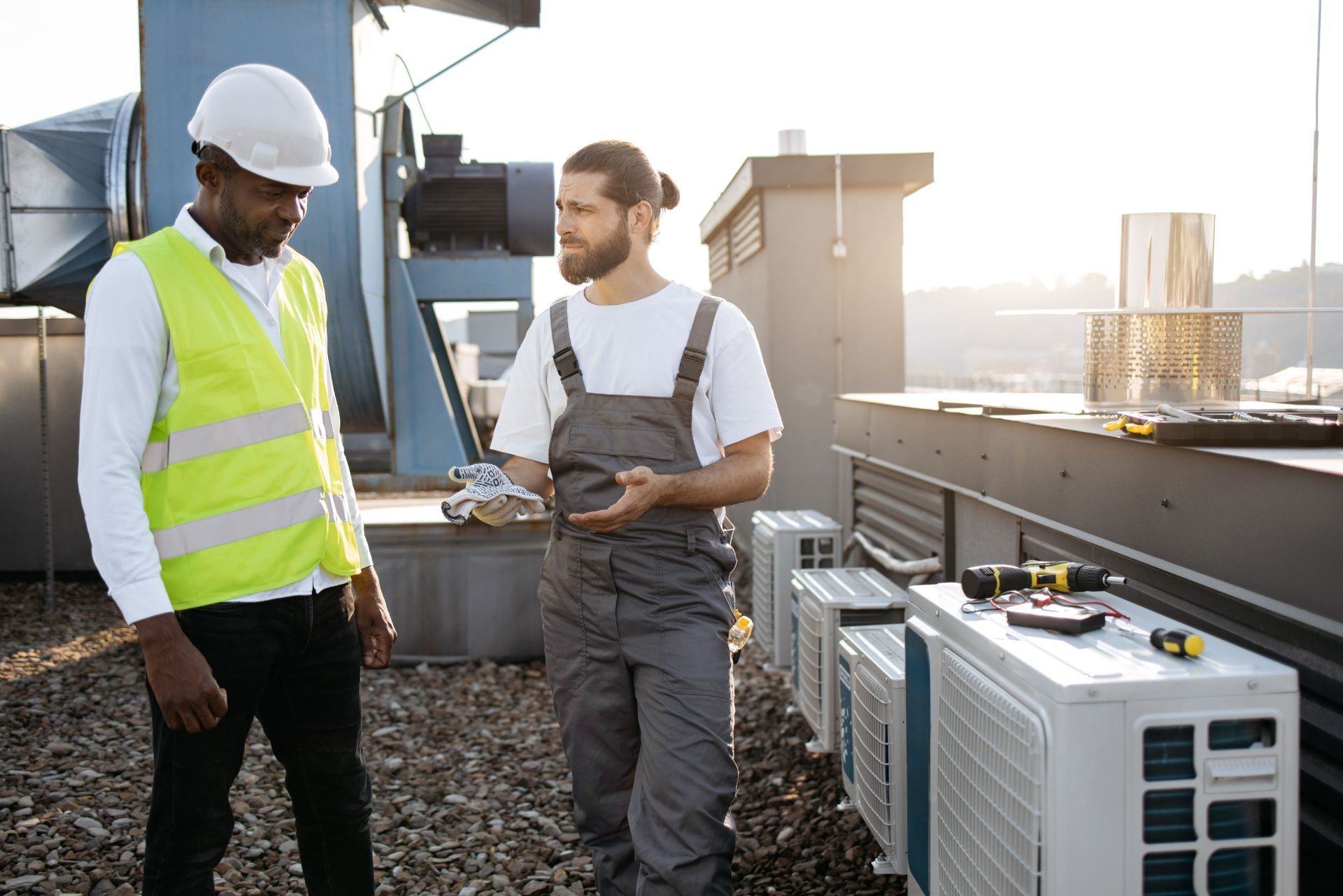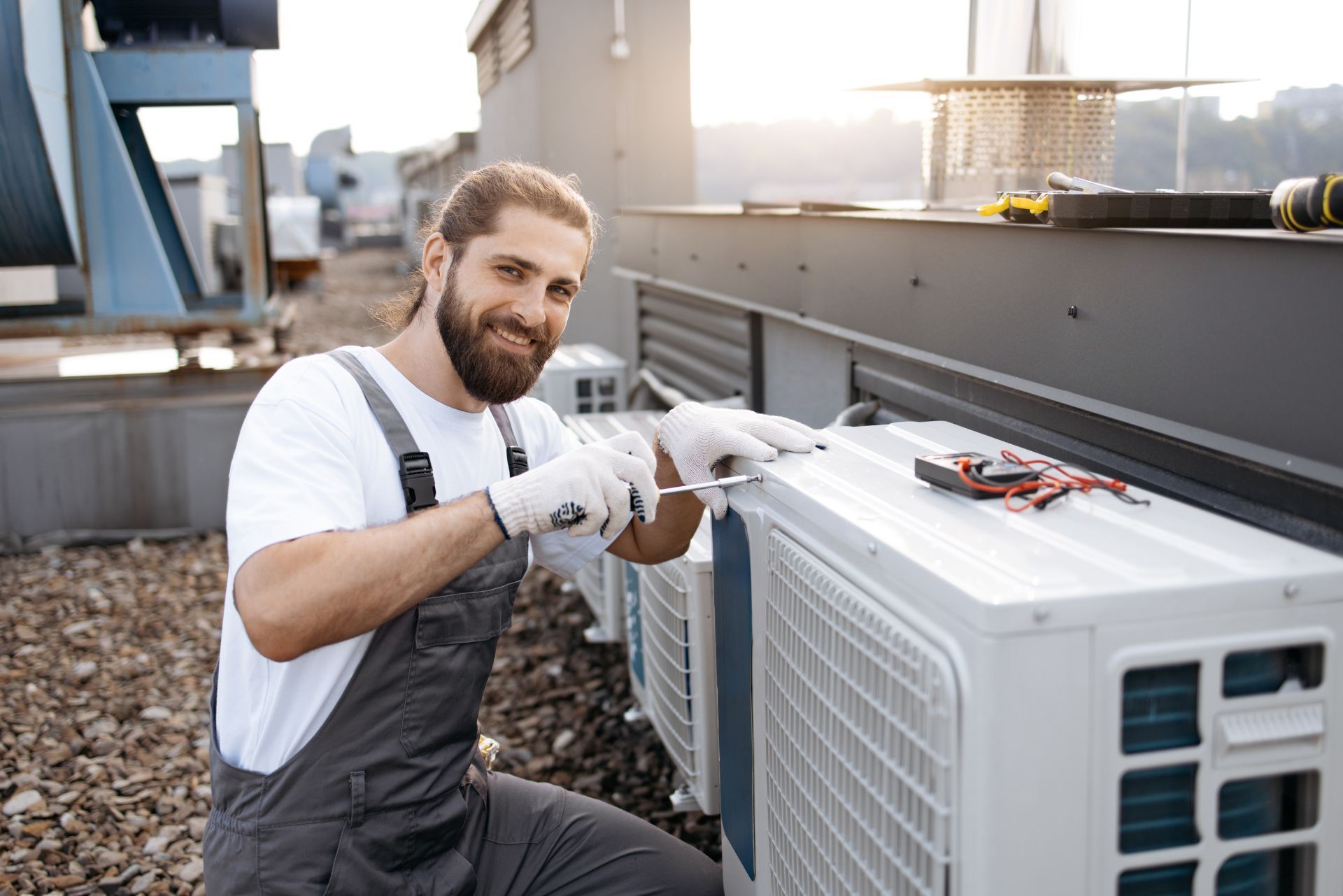Top 3 Recommended Policies

South Dakota’s HVAC contractors work through harsh winters and stormy summers, keeping homes and businesses running in every season. With extreme weather and a fast-growing construction market, contractors face constant exposure to risks that can impact safety and profitability. Having the right insurance coverage in place helps protect your business, your employees, and your clients from costly setbacks. This guide explains how HVAC contractor insurance in South Dakota works, the types of coverage you should consider, and how climate conditions and market trends are shaping the industry. Whether you focus on residential service calls or large commercial projects, understanding your insurance options will help you stay protected and prepared for the road ahead.
Why HVAC Contractor Insurance Is Crucial in South Dakota
South Dakota’s climate and economic landscape make insurance a critical consideration for HVAC contractors. Over the past several years, the state has experienced a significant rise in weather disasters, which directly affect home and business infrastructure. In fact, nearly half of the U.S.'s billion-dollar weather disasters in 2023 occurred in the Ninth Federal Reserve District, which includes South Dakota. This statistic highlights the heightened exposure HVAC contractors face when working on heating and cooling systems vulnerable to extreme weather events.
Moreover, South Dakota homeowners have seen insurance premiums increase by 41% over the past seven years, outpacing the national average hike of 34%. This surge reflects the growing risks associated with climate change and severe weather, which in turn influences the demand for HVAC repairs and replacements. Contractors must be prepared for these challenges by securing adequate insurance coverage to safeguard their operations.
In addition to the financial implications, the nature of HVAC work often involves navigating complex regulatory environments. South Dakota has specific licensing requirements and safety regulations that HVAC contractors must adhere to, which can vary significantly from one municipality to another. This regulatory landscape necessitates not only comprehensive insurance coverage but also a thorough understanding of local laws to mitigate potential liabilities. Without proper insurance, contractors risk facing hefty fines or legal repercussions that could jeopardize their business operations.
Furthermore, the importance of insurance extends beyond just protecting against natural disasters and regulatory compliance. It also plays a vital role in building trust with clients. Homeowners are increasingly seeking contractors who can demonstrate financial responsibility and reliability through adequate insurance coverage. By showcasing their commitment to safety and professionalism, HVAC contractors can enhance their reputation and attract more clients, ultimately leading to business growth. The peace of mind that comes from knowing they are protected can also empower contractors to take on more ambitious projects, knowing they have a safety net in place.
For more details on weather-related risks and insurance trends in South Dakota, visit the Federal Reserve Bank of Minneapolis report.

Understanding the Types of Insurance HVAC Contractors Need
HVAC contractors in South Dakota should consider several types of insurance to cover the broad spectrum of risks they face. The most common and essential policies include:
- General Liability Insurance: Protects against third-party claims of bodily injury or property damage arising from your work.
- Workers’ Compensation Insurance: Required by law, this covers medical expenses and lost wages for employees injured on the job.
- Commercial Auto Insurance: Covers vehicles used for business purposes, including service trucks and delivery vans.
- Tools and Equipment Insurance: Protects expensive HVAC tools and equipment from theft, loss, or damage.
- Professional Liability Insurance: Also known as errors and omissions insurance, it covers claims related to mistakes or negligence in your work.
Given the increasing severity of weather events in South Dakota, contractors should also consider business interruption insurance to cover lost income if operations are halted due to unforeseen circumstances such as storms or floods.
Why Climate Change Makes Insurance More Important
Anne Schechinger, Midwest director for the Environmental Working Group, emphasizes the strong connection between climate change and the vulnerability of farming businesses in the region. While her focus is on agriculture, the same environmental factors affect HVAC contractors who often work in rural and agricultural communities. Increased droughts, excess moisture, and hail not only damage crops but also strain local infrastructure, including heating and cooling systems.
This environmental volatility means HVAC contractors face a higher risk of property damage claims and business interruptions, making comprehensive insurance coverage more critical than ever. The federal government’s nearly $10 billion in crop insurance payments to South Dakota farmers between 2001 and 2022 underscores the scale of weather-related losses in the region, indirectly signaling the broader economic impact on related industries.
Moreover, as HVAC systems become more advanced and energy-efficient, the complexity of installations increases, which may lead to a higher likelihood of errors or malfunctions. This evolution in technology necessitates a robust professional liability insurance policy to safeguard against potential claims arising from these sophisticated systems. HVAC contractors must stay informed about the latest advancements in technology and the corresponding insurance implications, ensuring that they are adequately covered for any unforeseen challenges that may arise.
Additionally, the growing trend of sustainability and eco-friendly practices in the HVAC industry means that contractors are often tasked with retrofitting older systems or installing new, energy-efficient units. This shift not only requires specialized knowledge but also presents unique risks that may not be covered under standard insurance policies. As such, HVAC contractors should actively seek out tailored insurance solutions that account for these new responsibilities and the potential liabilities that come with them.
Learn more about these climate impacts from the
South Dakota News Watch.
South Dakota’s Growing HVAC Market and Its Insurance Implications
South Dakota’s population has increased by 2.5% from 2020 to 2022, fueling demand for residential and commercial construction projects. This growth directly benefits the HVAC industry, which is expected to expand alongside the broader construction sector. The Heating & Air Conditioning Wholesaling industry alone is projected to grow to $162.8 million by 2025, reflecting rising demand for HVAC equipment and services.
Similarly, the roofing contractors industry, which often works closely with HVAC professionals during building renovations and new constructions, is expected to grow to $125.5 million over the same period. This growth highlights the interconnected nature of construction-related trades and the importance of maintaining robust insurance coverage to handle the increased workload and associated risks.
With the construction sector offering an average annual pay of $58,955 in 2022, ranking 10th among all sectors in South Dakota, HVAC contractors are well-positioned to capitalize on this upward trend. However, the expanding market also means more exposure to liability and operational risks, reinforcing the need for tailored insurance solutions.
Moreover, as energy efficiency becomes a more pressing concern for homeowners and businesses alike, HVAC companies are increasingly being called upon to provide innovative solutions that not only meet regulatory standards but also enhance sustainability. This shift towards eco-friendly practices not only opens new avenues for business but also introduces unique challenges, such as the need for specialized training and equipment. As a result, HVAC contractors may find themselves needing to adjust their insurance policies to cover new technologies and practices, ensuring they are protected against potential liabilities associated with these advancements.
In addition to the technical aspects, the HVAC industry in South Dakota is also witnessing a surge in competition. New entrants are emerging, and established companies are expanding their services to include smart home technology integration, which requires a different skill set and knowledge base. This competitive landscape necessitates that HVAC businesses not only invest in their workforce but also reassess their risk management strategies. Comprehensive insurance coverage becomes crucial in this context, as it can safeguard against the financial repercussions of accidents, equipment failures, or even cyber threats that may arise from the increased reliance on technology in HVAC systems.
For industry growth insights, visit the IBISWorld Heating & Air Conditioning Wholesaling report and the IBISWorld Roofing Contractors report.

Key Considerations When Choosing HVAC Contractor Insurance
Selecting the right insurance policy involves understanding the specific risks your HVAC business faces in South Dakota. Here are some important factors to consider:
Assess Your Risk Exposure
Evaluate the types of projects you undertake, the equipment you use, and your geographic service area. Contractors working in rural areas or regions prone to severe weather may require additional coverage for natural disaster-related damages. Additionally, consider the types of clients you serve, as commercial projects may present different risks compared to residential jobs. Understanding your risk exposure allows you to tailor your insurance policy to better protect your business from unforeseen events, ensuring you have the right safety nets in place.
Understand Legal Requirements
South Dakota mandates workers’ compensation insurance for most employers, but other policies like general liability and commercial auto insurance, while not always legally required, are strongly recommended to protect your business assets. Familiarizing yourself with local regulations can prevent costly fines and ensure compliance. Furthermore, some contracts with larger clients may require proof of specific insurance coverage, making it crucial to have the necessary policies in place to secure lucrative contracts and maintain a good reputation in the industry.
Consider Business Size and Workforce
Smaller businesses might find bundled insurance packages more cost-effective, while larger contractors with multiple employees and vehicles may need customized coverage to address their complex operations. It’s also essential to evaluate the skill levels of your workforce; specialized technicians may require additional liability coverage due to the nature of their work. As your business grows, regularly reassessing your insurance needs can help you avoid gaps in coverage and ensure that your policy evolves alongside your operations.
Review Policy Limits and Exclusions
Carefully review what each policy covers and any exclusions that may apply, especially concerning weather-related damages or equipment failures. Some insurers offer endorsements or riders to extend coverage for specific risks. It’s wise to consult with an insurance agent who specializes in contractor insurance to help you navigate these details. They can provide insights into common exclusions and recommend additional coverage options that align with your business activities, ensuring you are adequately protected against potential liabilities.
The Role of Insurance in Business Continuity and Growth
Insurance is not just a protective measure but a strategic tool that enables HVAC contractors to operate confidently and pursue growth opportunities. With South Dakota’s construction sector expanding and the HVAC market growing, having the right insurance can help contractors secure larger contracts and partnerships. The competitive landscape often demands that businesses demonstrate their reliability and preparedness, and a robust insurance portfolio can serve as a testament to a contractor's professionalism and commitment to risk management.
In the event of property damage, liability claims, or employee injuries, insurance ensures that financial setbacks do not cripple your business. This stability is crucial for maintaining client trust and meeting regulatory requirements. Furthermore, having comprehensive coverage can enhance your reputation in the industry, as clients are more likely to choose contractors who are adequately insured. This not only opens doors to new projects but also fosters long-term relationships with clients who appreciate the peace of mind that comes with working with a responsible contractor.
Additionally, business interruption insurance can provide a safety net during unforeseen events, such as severe storms that have become more frequent in South Dakota. This coverage helps maintain cash flow and employee wages even when work is temporarily halted. Moreover, the importance of risk assessment cannot be overstated; by regularly reviewing and updating insurance policies, HVAC contractors can ensure that they are adequately protected against emerging risks, such as cyber threats or changes in environmental regulations. This proactive approach not only safeguards the business but also positions it for sustainable growth in an ever-evolving market.
Moreover, investing in specialized insurance products, such as equipment breakdown coverage, can further bolster an HVAC contractor's resilience. Given the reliance on sophisticated machinery and technology in the HVAC industry, having coverage that addresses potential equipment failures can prevent costly downtime and service interruptions. This type of insurance not only protects the contractor's assets but also ensures that clients receive timely service, thereby reinforcing the contractor's reputation for reliability and efficiency. In an industry where time is often of the essence, the right insurance can make all the difference in maintaining operational continuity and achieving business objectives.
Tips for Finding the Best HVAC Contractor Insurance in South Dakota
Finding the right insurance provider and policy requires research and comparison. Here are some tips to guide you:
- Work with Experienced Insurers: Choose companies familiar with the HVAC industry and South Dakota’s unique risks.
- Compare Quotes: Obtain multiple quotes to understand pricing and coverage differences.
- Ask About Discounts: Some insurers offer discounts for safety training, bundling policies, or having a strong claims history.
- Review Customer Service: Reliable claims processing and responsive customer support are vital during emergencies.
- Consult Industry Associations: Local trade groups and chambers of commerce can recommend reputable insurance providers.
In addition to these tips, it is essential to understand the specific coverage types that are particularly relevant to HVAC contractors. General liability insurance is crucial as it protects against third-party claims of bodily injury or property damage. Additionally, consider obtaining professional liability insurance, which covers claims related to errors or omissions in your work. This is especially important in an industry where precision and expertise are paramount to ensuring customer satisfaction and safety.
Furthermore, staying informed about the regulatory landscape in South Dakota can significantly impact your insurance needs. Local laws may dictate specific requirements for HVAC contractors, such as licensing and bonding, which can influence the type of coverage you should consider. Engaging with a knowledgeable insurance broker who specializes in contractor insurance can provide valuable insights into these regulations, ensuring that you not only comply with the law but also secure the best possible protection for your business.
Conclusion: Protecting Your HVAC Business Amid South Dakota’s Changing Landscape
South Dakota’s HVAC contractors operate in an environment marked by increasing weather-related risks and a growing construction market. These factors make securing comprehensive insurance coverage more important than ever. From general liability and workers’ compensation to specialized policies addressing climate-related damages, the right insurance safeguards your business against financial loss and operational disruptions.
By understanding the state’s unique challenges and leveraging available insurance options, HVAC contractors can build resilience and position themselves for long-term success. Staying informed about industry trends and maintaining open communication with your insurer will ensure your coverage evolves alongside your business needs.
For further insights on South Dakota’s insurance landscape and climate impacts, explore the
Federal Reserve Bank of Minneapolis report and the
South Dakota News Watch article.
Contact Us
HVACInsure is fully licensed and permitted to sell contractor and commercial insurance in South Dakota.
We proudly serve clients throughout South Dakota and maintain partnerships with local South Dakota insurance carriers to ensure HVAC professionals receive compliant, affordable, and comprehensive coverage that meets project and regulatory requirements.
HVACInsure Focuses on South Dakota HVAC Contractor Insurance
Sioux Falls – Rapid City – Aberdeen – Brookings – Watertown – Mitchell – Yankton – Huron – Pierre – Vermillion – Spearfish – Brandon – Box Elder – Sturgis – Madison – Belle Fourche – Harrisburg – Tea – Dell Rapids – Mobridge – Hot Springs – Lead – Canton – Milbank – Chamberlain
Frequently Asked Question
Common HVAC Contractor Insurance Questions in South Dakota
These FAQs address common contractor questions. As HVACInsure grows, we will update this section with real client experiences and answers.
How does South Dakota's extreme weather affect my HVAC insurance?
South Dakota sees harsh winters and hot summers. We cover year-round demand, emergency service, and the extreme weather challenges involved.
What coverage do I need for Sioux Falls and Rapid City commercial work?
South Dakota's cities are growing. We cover the liability exposure and certificate requirements of commercial projects.
Do I need special coverage for agricultural HVAC applications?
South Dakota's farms need climate control. We cover livestock facilities, grain storage, and the equipment agricultural operations require.
What about coverage for Black Hills tourism facility work?
The Black Hills attract millions of visitors. We cover resort and hospitality HVAC work in the region's tourism industry.
How do South Dakota's licensing requirements affect my insurance?
South Dakota contractor requirements vary by city. We help you meet local requirements across your service area.
Can I get coverage for work across South Dakota's wide distances?
Absolutely. South Dakota is large and rural. We structure coverage that addresses travel and remote service challenges.

Still have questions?
Can’t find the answer you’re looking for? Please chat to our friendly team!

About The Author: James Jenkins
I’m James Jenkins, Founder and CEO of HVACInsure. I work with HVAC contractors and related trades to simplify insurance and make coverage easier to understand. Every day, I help business owners secure reliable protection, issue certificates quickly, and stay compliant so their teams can keep working safely and confidently.
Recognized by National HVAC Trade Associations
These trusted organizations set best practices and standards that carriers rely on when underwriting HVAC risks.
Membership signifies adherence to HVAC industry standards and contractor best practices.


